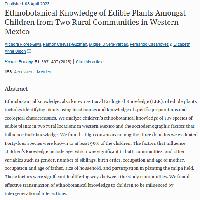Resumen
- Ethnobotanical knowledge, also known as Local Ecological Knowledge (LEK), of edible plants includes identifying plants using local names and knowledge of specific preparations and ecological characteristics. We analyze children’s ethnobotanical knowledge of 107 species of edible plants in two rural locations in western Mexico and the sociodemographic factors that influence their knowledge. We found a high consensus among the three domains we evaluated. Forty-four species were known to at least 90% of the children. The factors that influence children’s knowledge include age, which was significant in both communities, and other variables such as gender, number of siblings, birth order, occupation and age of mother, occupation and age of father, size of household, and participation in planting the milpa field. These factors were significant in differing ways between the study communities. We found effective transmission of ethnobotanical knowledge to children to be influenced by intergenerational interactions.
